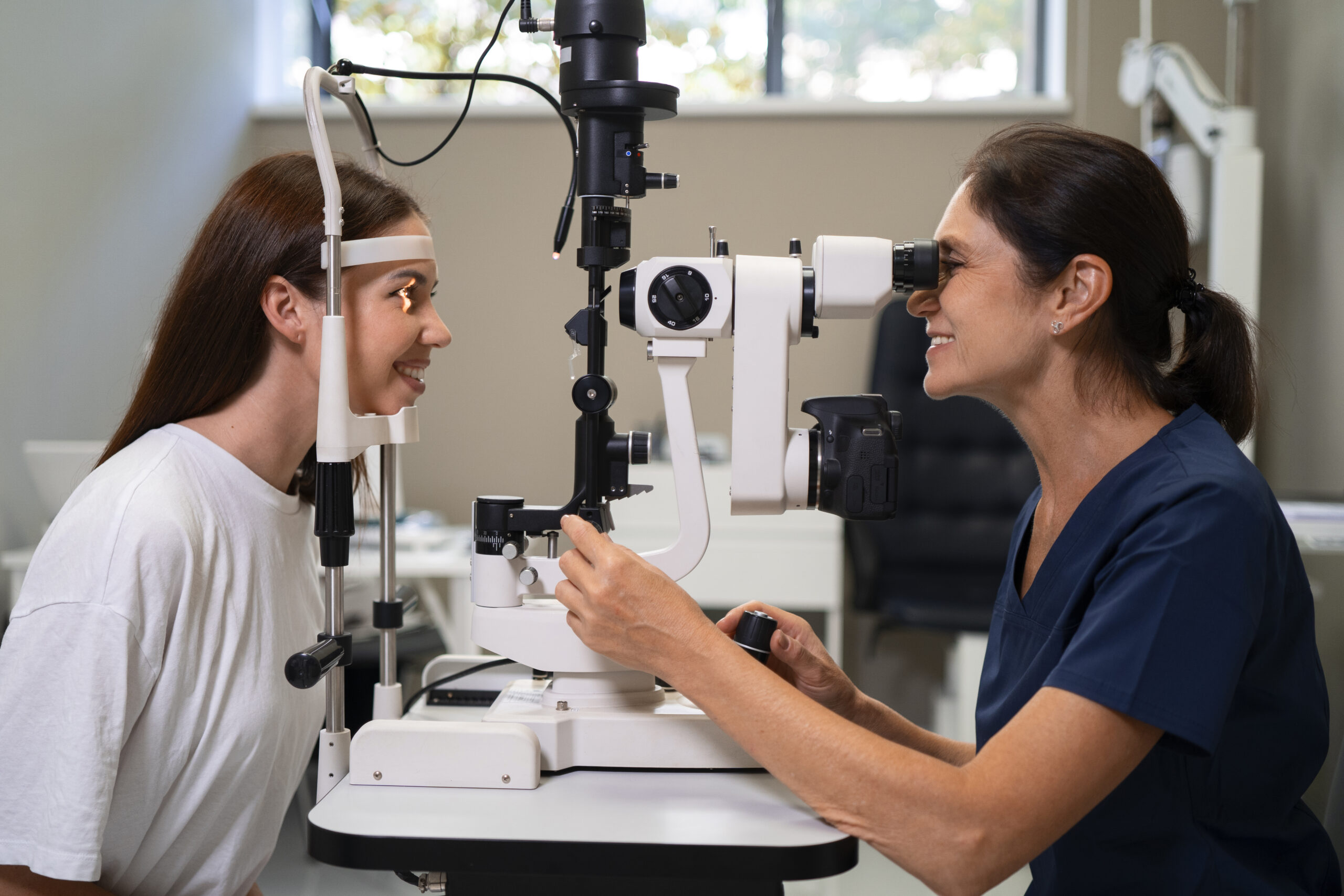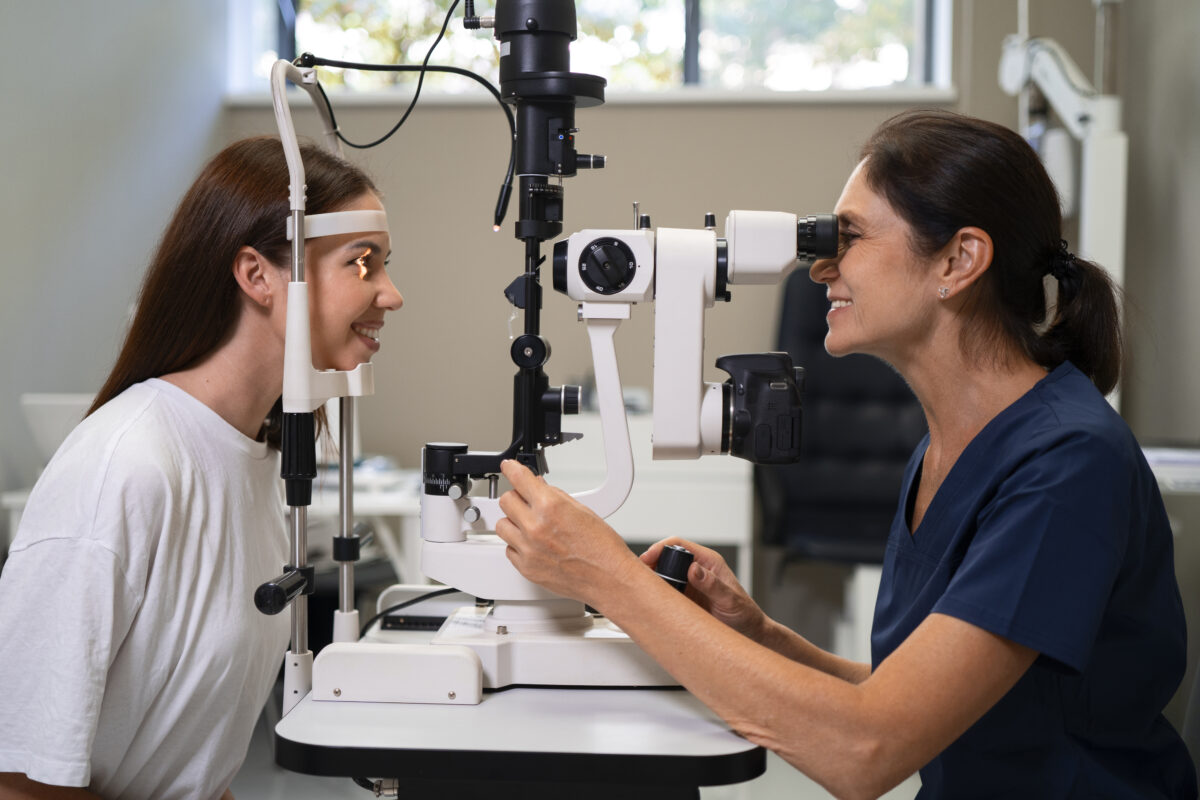Are You Struggling to Read This? Here Are 6 Signs That It Might Be Time for an Eye Exam!
October 9, 2024
Have Any Questions?
Please contact us, if you have any queries
Categories

In our busy lives, we often focus on completing tasks like meeting work deadlines or staying connected with family and friends. Yet, when it comes to our personal health—particularly eye health—many of us tend to delay taking action. Often, we only consider an eye exam when we experience significant discomfort or need a new prescription. This common approach can result in missed opportunities for the early detection and treatment of eye conditions. If you’re experiencing any of the following six signs, it might be time to prioritize your eye health and schedule an eye exam at Dr. Rani Menon Maxivision.
1. Blurred vision
Blurred vision isn’t just a minor annoyance; it could be a signal of an underlying vision issue. When your eyes have trouble focusing clearly on objects at various distances, it might be due to refractive errors such as nearsightedness (myopia), farsightedness (hyperopia), or astigmatism. These conditions are typically corrected with prescription glasses or contact lenses. However, persistent blurred vision might also indicate more serious issues, such as cataracts or retinal problems. Consulting an eye care professional can help identify the root cause and determine the right treatment.
2. Eye Strain
In today’s digital age, many of us spend extended periods staring at screens, whether for work, entertainment, or communication. This constant screen time can lead to digital eye strain, characterized by symptoms such as red, dry, or itchy eyes. If you experience discomfort after long hours of screen use or other visually intensive tasks, it might be time for an eye exam. Prolonged eye strain can impact your daily life, leading to decreased productivity and discomfort. An eye care specialist can evaluate whether you need corrective lenses or adjustments to your screen habits to alleviate these issues.
3. Frequent Headaches
Frequent headaches can be a sign of several issues, including eye strain. If you frequently experience headaches after reading, using electronic devices, or engaging in other close-up activities, your eyes might be overworking to focus. This strain can result in tension headaches, often radiating to the forehead or temples. An eye exam can help determine if uncorrected vision problems are contributing to your headaches. Proper vision correction can alleviate these symptoms and prevent further discomfort.
4. Difficulty Seeing or Driving at Night
Struggling to see clearly at night can significantly affect your safety and quality of life. If you have trouble reading street signs, navigating poorly lit areas, or dealing with glare from headlights while driving, it could indicate night blindness or other vision problems. Night blindness, also known as nyctalopia, impairs your ability to see in low-light conditions, while conditions like cataracts can cause clouding of the eye’s lens, impacting night vision. An eye exam can diagnose these issues and recommend appropriate treatments, such as corrective lenses or surgical options, to enhance your night vision.
5. History of Diabetes or Glaucoma
If you have a personal or family history of diabetes or glaucoma, it’s crucial to prioritize regular eye exams. Both conditions can have significant effects on eye health. Diabetes can lead to diabetic retinopathy, where high blood sugar levels damage the blood vessels in the retina, potentially causing vision loss. Glaucoma, characterized by increased eye pressure, can damage the optic nerve and lead to progressive vision loss if untreated. Regular eye exams are essential for monitoring these conditions and managing their impact on your vision. Early detection and treatment can help prevent severe complications and maintain eye health.
6. If You Can’t Remember Your Last Eye Exam
Many people overlook the importance of regular eye exams and may not remember when their last check-up occurred. If it’s been over a year since your last eye exam or if you can’t recall when you had one, it’s time to schedule an appointment. Regular eye exams are vital for maintaining optimal vision and detecting potential issues before they become severe. Even if you don’t currently wear glasses or have noticeable vision problems, routine check-ups can catch early signs of conditions like glaucoma, macular degeneration, or diabetic retinopathy.
What to Expect During an Eye Exam?
Understanding what happens during an eye exam can help ease any concerns you might have. At RMC (Dr. Rani Menon Maxivision), our comprehensive eye exams include several key components:
Personal Assessment: We begin by gathering information about your general health, family history of eye conditions, and any symptoms you may be experiencing. This helps us understand your overall eye health and tailor the exam to your needs.
- Visual Acuity Test: This test measures how well you can see at different distances. You’ll read letters or symbols from an eye chart to assess your vision clarity.
- Refraction Eye Test: Using a device called a phoropter, we determine the precise prescription needed for corrective lenses. This involves testing various lenses to find the combination that provides the clearest vision.
- Eye Muscle Coordination Test: This test evaluates how well your eye muscles work together, which is essential for effective binocular vision.
- Peripheral Vision Test: Also known as visual field testing, this assesses your side (peripheral) vision and helps detect conditions like glaucoma.
- Intraocular Pressure Measurement: This test measures the pressure inside your eyes, which is important for detecting glaucoma.
- Slit Lamp Examination: This detailed examination uses a microscope-like instrument to inspect the front and back parts of your eyes. It helps detect conditions like cataracts, macular degeneration, and diabetic retinopathy.
- Dilation: Sometimes, eye drops are used to widen the pupils, allowing for a thorough examination of the retina, optic nerve, and blood vessels in the back of the eyes.
- Additional Tests: Depending on your needs, we may use diagnostic tools like ocular keratography, meibography, and retinal imaging to assess corneal health, tear production, and retinal conditions.
Make Your Eye Health a priority.
If you’ve noticed any of the signs mentioned above or it’s been a while since your last eye exam, it’s time to schedule an appointment at RMC. Regular eye exams are crucial for maintaining your eye health and detecting potential issues early. By prioritizing your eye health today, you can ensure clear vision and overall well-being for years to come.
Don’t wait for problems to arise—make your eye health a priority. Visit Dr. Rani Menon Maxivision today to schedule your comprehensive eye exam. Your vision is invaluable—book an appointment now and see the world clearly and brightly!

